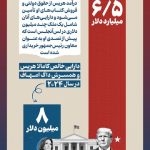“Mehdi Arabzadeh”, in a conversation with Hoshio, examined the quality of holding the Emirates GITEX exhibition and its strengths and weaknesses. While analyzing the state of technology in Iran, he pointed out the future of artificial intelligence and the challenges in this field.
The quality of holding GITEX: from features to challenges
Mr. Arabzadeh pointed out that GITEX is of particular importance as the largest technology unveiling event in the Middle East, and stated: “This event is not only known as a representative of today’s technologies, but also has a very high quality. The UAE has been able to put all the finishing touches and hold this exhibition with a quality worthy of its name.”
Smart exhibition and digital innovations
He mentioned the special features of the exhibition and said: “The exhibition was a unique experience in terms of organization and quality of services provided. By using the Gitex application, all the tasks related to communication and scheduling meetings were easily possible. By scanning the QR codes of the companies, we could easily communicate with them and even had the map of the halls available. This kind of intelligent management clearly shows the high quality of holding this exhibition.”
Strengths and weaknesses of Gitex
Mr. Arabzadeh went on to discuss the strengths and weaknesses of Jitex and stated: “The strength of this exhibition was the presence of reputable and large companies in the field of technology. Companies that were able to present their products in the best possible way. For example, Microsoft introduced its product portfolio with an innovative approach at this exhibition.
He also pointed out the weaknesses and said: “Although big companies were present in this exhibition, somehow small and low-quality companies were also seen next to them. This situation somehow indicated the lack of coordination between the reputable brands and lesser known names. “The exhibition space was sometimes drawn towards disorder and crowding, which affected the experience of the visitors.”
Iran’s experiences from GITEX
Arabzadeh spoke about the future of technology in Iran and how events like GITEX can be modeled and said: “Currently, considering the political and governance structure of the country, holding an event similar to GITEX in Iran seems like an unattainable dream. Until the political and governance issues are resolved, we will not see events of similar quality.”
He continued: “The best solution for us is to take advantage of the experiences and successful models of other countries and instead of imitating them, use their experiences to create our own models. For example, the UAE has been able to build smart cities by using artificial intelligence and algorithmic governance, which has had a tangible impact on the lives of its citizens.
The Future of Artificial Intelligence: An Opportunity for Innovation
Mr. Arabzadeh also said about the future of artificial intelligence: “Today, we can no longer think only about the future of artificial intelligence opportunities, but we are becoming digital domination.” Countries that have ideas in this area will influence the future of the digital economy. These developments indicate the need to change our governance and economic structure.”
In the end, Mehdi Arabzadeh said: “We should learn from the experiences of advanced countries and try to create a suitable model for a brighter future in the field of technology and artificial intelligence by using local capabilities. Otherwise, we will only remain in the background of global developments.”
In this conversation, Mehdi Arabzadeh examined the quality of holding GITEX, its strengths and weaknesses, as well as the future challenges of artificial intelligence. Emphasizing the need to learn from the experiences of advanced countries, he outlined new perspectives for the future of technology in Iran.
RCO NEWS















